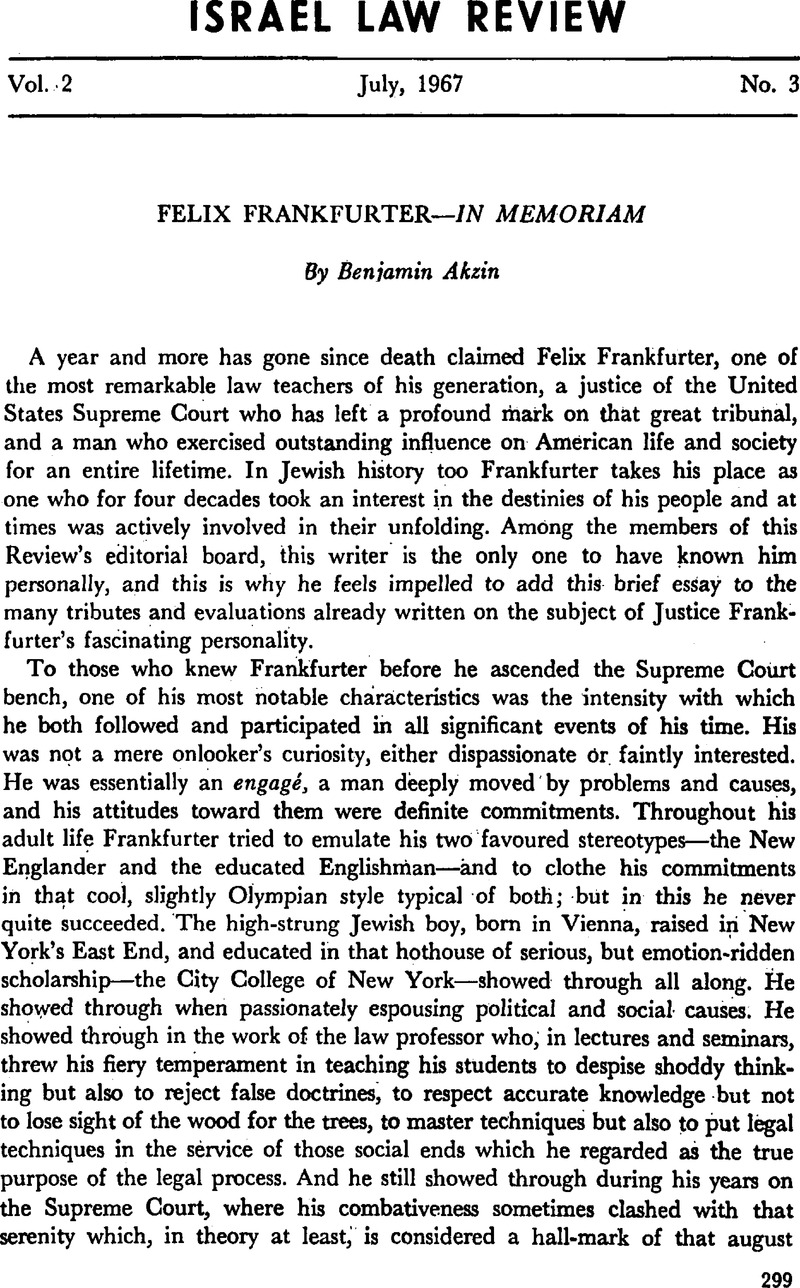Published online by Cambridge University Press: 12 February 2016

1 Bunting v. Oregon, 243 U.S. 426 (1917); Stettler v. O’Hara, 243 U.S. 629 (1917); Colyer v. Skeffington, 265 Fed. 17 (1920); Adkins v. Children’s Hospital, 261 U.S. 525 (1923).
2 See Frankfurter’s article: “The Palestine Situation Restated” (Foreign Affairs, April 1931).
3 Lawyers who became outstanding statesmen were of course no novelty in American history. From Jay through Marshall, Webster, Calhoun, Lincoln, and to Elihu Root, Taft, Stimson and Hughes, they were numerous. But Frankfurter was the first leading academic lawyer to enter this road.
4 This term is used in the sense employed by the late ProfessorCahn, Edmond in his The Sense of Injustice, N.Y.U. Press, 1949Google Scholar.
5 In practice Frankfurter went far beyond Pound. After their joint public intervention (together with other lawyers) following the Abrams case—Abrams v. U.S., 250 U.S. 616 (1919)—in which they protested questionable practices of the Federal Department of Justice, Pound became rather reticent in taking up positions in public. In the Sacco-Vanzetti case the two men parted company rather pointedly, and in later years Pound became fairly conservative in his outlook (in which, some critics might say, he did no more than anticipate Frankfurter). Nevertheless, the basically sociological approach of Pound to law continued to serve as theoretical underpinning for all those on the American scene who looked upon law as a vehicle for social progress and. not merely as a defence-mechanism for the existing order of things.
6 A certain change seems, though, to have taken place in Frankfurter's views in this respect. In his early writings one may detect a tendency to allot to courts a larger place in adapting law to new conditions. See, in this sense: Bickel, A. M., “Applied Politics and the Science of Law: Writings of the Harvard Period”, in: Mendelson, W. (ed.), Felix Frankfurter—A Tribute, N.Y., 1964, p. 164 ffGoogle Scholar.
7 In addition to W. Mendelson, op. cit., see particularly: Jacobs, C.E., Justice Frankfurter and Civil Liberties, U. of California Press, 1961Google Scholar; Jaffe, L. L., “The Judicial Universe of Mr. Justice Frankfurter” (1949) 62 Harv. L.R. 353–412CrossRefGoogle Scholar; Mendelson, W., Justices Black and Frankfurter: Conflict in the Court, U. of Chicago Press, 1961Google Scholar; Thomas, H. S., Felix Frankfurter: Scholar on the Bench, Johns Hopkins Press, 1960Google Scholar. See also: Forkosch, M. O. (ed.), Essays in Legal History in Honor of Felix Frankfurter, N. Y., Bobbs-Merrill, 1966, pp. 29–73, 289–319, 337–49Google Scholar. Excerpts from Justice Frankfurter's principal opinions up to 1949 are assembled in: Konefsky, S. J., The Constitutional World of Mr. Justice Frankfurter, N.Y., Macmillan, 1949Google Scholar.
8 Frankfurter, F., Some Reflections on the Reading of Statutes, Ass'n of the Bar of the City of New York, 1947, p. 15 fGoogle Scholar.
9 310 U.S. 586 (1940).
10 319 U.S. 624 (1943).
11 330 U.S. 1 (1947).
12 333 U.S. 203 (1948).
12a Possibly, the Court has moved too far from these concepts, especially in the field of criminal law. A swing back to Frankfurter's position of self-restraint may be due soon. Cf. Mason, A. T. “Understanding the Warren Court” (1966) 81 Pol. Sci. Q. 523–63CrossRefGoogle Scholar.
13 On Pound, see: Stone, J., “Law and Society in the Age of Roscoe Pound” (1966) 1 Is.L.R. 173–221Google Scholar.–In a way, younger teachers and graduate students at Harvard Law School tended to divide between “Frankfurterites” and “Poundites”. It is only fair to admit that this writer belonged to the camp of Pound-followers. He hopes that this fact does not unduly colour the present essay.
14 Frankfurter's most significant works are: Petty Federal Offenses and the Constitutional Guarantee of Trial by Jury (with Corcoran, Th. G.) (1926) 39 Harv. L.R. 917–1019Google Scholar; The Case of Sacco and Vanzetti, Boston, Little Brown, 1927Google Scholar; The Business of the Supreme Court (with Landis, J.), N. Y., Macmillan, 1928Google Scholar; The Labor Injunction (with Greene, N.), N.Y., Macmillan, 1930Google Scholar; The Public and Its Government, Yale U. Press, 1930Google Scholar; The Commerce Clause under Marshall, Taney and Waite, U. of North Carolina Press, 1937Google Scholar. And see three volumes of collections of Frankfurter's papers and addresses: Law and Politics, N.Y., Harcourt, 1939Google Scholar; Of Law and Men, N.Y., Harcourt, 1956Google Scholar; Of Law and Life and Other Things that Matter, Harvard U. Press, 1965Google Scholar. And further see the volume: Felix Frankfurter Reminisces, N.Y., Reynal, 1960Google Scholar.